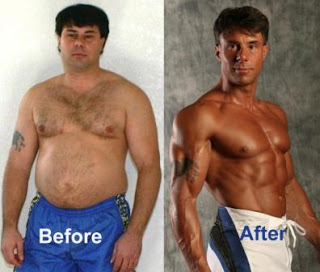The desire for "perfection" can be learned from your parents or from living in a culture obsessed with beauty and wealth. You are reminded on a daily basis what you could have or look like if you just worked a little harder and had more control.
When you start a new weight loss program, it's normal for you to follow the rules of the program exactly. In doing this, you trust that you'll be successful in melting off your unwanted pounds. You're convinced that this approach is the right one until you hit the familiar "speed bumps" that zap your motivation and brings your new program to a grinding halt. The first step to long-term weight loss success is to see how your tendencies are sabotaging your program.
[pagebreak]
The perfectionistic dieter is one that can answer YES to at least 5 of these 10 questions:
1. Do you typically begin your new program on a Monday?
2. Do you typically want to "speed up" the process and are willing to eat less than what the program recommends or exercise more to reach your goal?
3. Do you expect to suffer with your new program and feel deprived?
4. Do you enjoy the thrill of eliminating certain foods or entire food groups?
5. Do you battle strong urges to eat unhealthy foods or skip exercise?
6. Do you use the words "good" or "bad" to describe certain foods and your eating behavior?
7. Do you fall off the wagon when you have a bad night, sometimes even after just making an unhealthy food choice?
8. Do you struggle with feelings of guilt, thinking that you could be doing better?
9. Do you believe the motto, "no pain, no gain" is true?
10. Are you convinced that past failed attempts were lack of effort and/or staying focused?
The perfectionistic dieter typically sees great results and feels completely in control for a few weeks or months. If this is you, then you know how the bottom can fall out and how your motivation can disappear overnight.
Often a major life event, like getting a new job or moving, causes you to abandon your program because you can't "give it the attention it deserves." You put this unfinished project back on the shelf until later, at which point, you've gained much of your weight back.
How does the perfectionistic dieter break free of a pattern that simply doesn't work? The answer is to shift to the 80/20 approach, which means learning to make healthy choices 80% of the time. The 80/20 approach leaves room in your weight loss program for both planned and surprise indulgences.
By adapting the following 10 keys, you will be able to adapt the 80/20 approach and escape the perfectionism trap once and for all.
More from Prevention: How To Love The Body You Have
[pagebreak]
10 Keys to Escaping Perfectionism
1. Avoid using the words "good" or "bad" to describe you, your food, or your behavior. Instead, choose the words "healthy" or "unhealthy." The words "good" and "bad" convey judgment and can easily mean "good me" and "bad me." We often reward ourselves when we've been "good" and punish ourselves when we've been "bad." These words promote the all-or-nothing pattern that you're trying to escape.
2. Choose a healthy program like the Flat Belly Diet Online and follow the guidelines. With clearly defined goals and a healthy diet structure, you'll be able to find the "zone" where you are not hunger and are still losing weight. If you don't have a structure, you're left guessing and will error on the side of hunger and deprivation to get your results.
3. Establish a range for your goals to allow for more flexibility. For instance, walking 30 minutes, 4-6 times this week is a healthier goal than a goal of walking every day. The problem with an everyday goal is that when you miss it just once, you have failed to reach your weekly goal and feel frustrated.
4. Build food treats into your diet on a regular basis. The best way to keep cravings under control is to give yourself permission to have them on occasion, without guilt, as part of your program. When you know how many calories the food has, you'll be more comfortable with eating it since you can see how it fits into your program without "ruining things."
5. Take a day off from exercise each week. That's right. Give yourself a day away from exercise every week and use the time to focus on a nurturing activity for yourself, like a hobby, reading a good book or writing.
6. Avoid unrealistic goals for yourself when traveling or on a vacation. Nothing zaps your program faster than trying to do the impossible and not being able to do it. Make peace with the idea that a "maintenance" week or weekend is OK. A maintenance week is one where you make mostly good choices but are not striving for the same goals as when you're in your regular routine.[pagebreak]
7. Post reminders to yourself that it's OK to be "average." Place a note on your mirror, in your car, or your calendar to remind yourself to relax and let go of trying to be perfect. Thin people are not perfect; the majority of them simply make healthy choices most of the time.
8. Be accountable to a professional. The easiest way to reach your goals and stick with your program is to be accountable to a nutritionist, personal trainer, counselor, coach, or organization. It's important to listen to their advice and give up thinking that you "know better" if your past weight loss efforts have proven otherwise.
9. Journal about your emotions. You won't be able to suppress your emotional self for very long, so give it a voice in your journal to speak freely. You'll find that you can learn to negotiate with your emotional self and its desire to sabotage your efforts if you listen to it instead of trying to control it.
10. Have realistic weight loss expectations! Nothing will cause more frustration than thinking that you should be losing weight faster. Aim to lose up to 1% of your body weight, week-in and week-out, but realize that plateaus are a normal part of the journey. Remember that slow and steady wins the weight loss race!
With practice, and ironically, allowances for imperfection, you can establish a new and healthier approach for yourself based on the 80/20 approach. It's not as glitzy or glamorous as the perfectionistic, all-or-nothing approach but it is based on solid behavioral science and will give you something that has been missing from your past efforts: lasting results!
More from Prevention: 10 Ways To Beat A "Fat" Day




